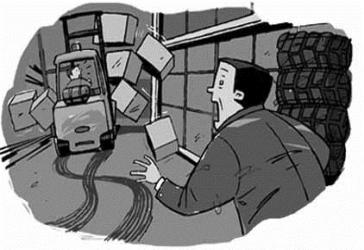
Good quality tyres moved 14% more pallets in a single shift.
We all like a bargain… especially in tough times. The trouble is that paying less can actually cost more in the long run… Take tyres. They are all much the same, right? WRONG! In a recent, wide-ranging and rigorous study we discovered that cheap tyres affect stability and dramatically reduce productivity, making them a very poor investment.
During forklift tests, our independent research team closely examined cut-price imported tyres. It’s easy to see how someone could mistake them for their high-quality counterpart. After all, they look the same as any other forklift truck tyres and are designed to fit wheel rims. And while the truck is being driven without a load they even perform like manufacturer-approved tyres.
As soon as a load was added, though… all that changed! The truck involved no longer stayed in-line, but drifted sideways. An increased feeling of instability shredded our operators’ driving confidence – and productivity. During braking and on bends, the tyres seemed springy – so much so that our drivers felt as though they were actually losing control of the truck.
False economy
So, why would anyone fit such a tyre? Price, of course. Markedly less expensive, these tyres are pleasantly soft, so it’s natural to assume they are comfortable. However, because of all their wobbling, they actually increase body vibration values. The energy loss in the cushioning rubber can also be greater than you might expect.
So to get the maximum driving time from a battery or tank of fuel, our advice is: choose a higher quality tyre make.
Worth the trouble
Using a single forklift truck, our testers carried out the same tasks with 12 different makes and types of tyre. To ensure our comparisons were meaningful, the work method and driver were kept constant.
Our tests revealed that the highest measured speed was 16.24km/hour, the lowest 15.8km/hour. Energy consumption varied between 6.87 and 7.72kWh, with the total number of pallets moved per hour between 58.2 and 61.9.
If we take into account all of these aspects – by make and type – and then look at the number of pallets moved per battery charge (80V/480Ah), the best performing tyre moved 411 pallets, while the least efficient only moved 360 – a massive difference of 14.16%.
Finding a perfect match
Our researchers also discovered during the course of testing that fitting the wrong make of tyre can heavily impact upon performance. Some tyres are designed to improve stability and boost throughput. Others are more wear-resistant and save on energy.
To choose the best tyre for your truck and application, we recommend you do two things:
- Establish your priorities
- Take account of your work environment
As a basic rule of thumb, when dealing with poorer surfaces it makes sense to choose a more comfortable tyre. On good surfaces it is best to choose a tyre designed for stability. This gives a feeling of both greater confidence and safety.
Our conclusion?
When it comes to maximising productivity, work from the ground up… and start by taking a closer look at your tyres. Although manufacture-approved tyres might require a larger initial outlay, their long-term impact on safety, productivity and maintenance costs often makes them the most economical option for any application.
